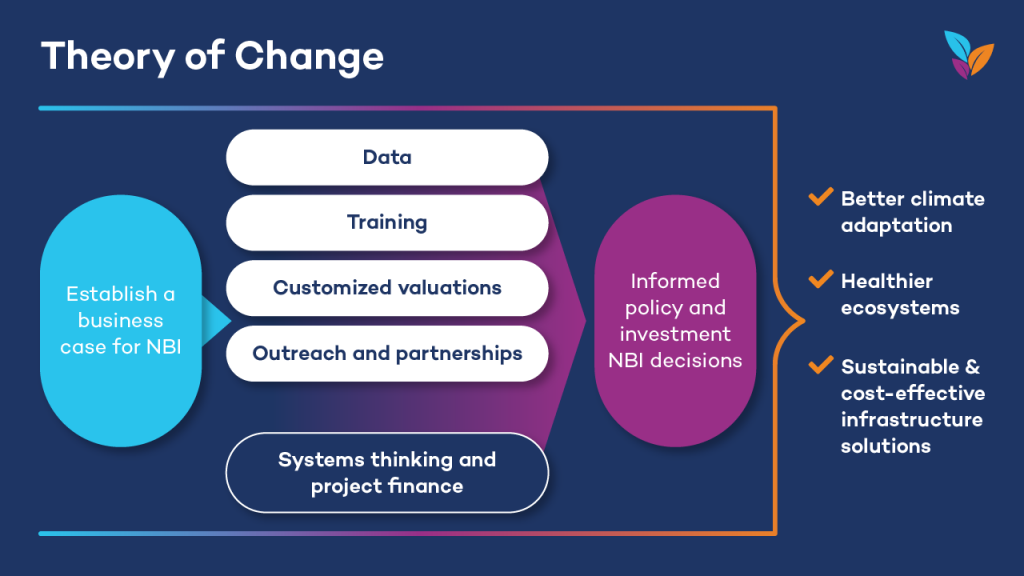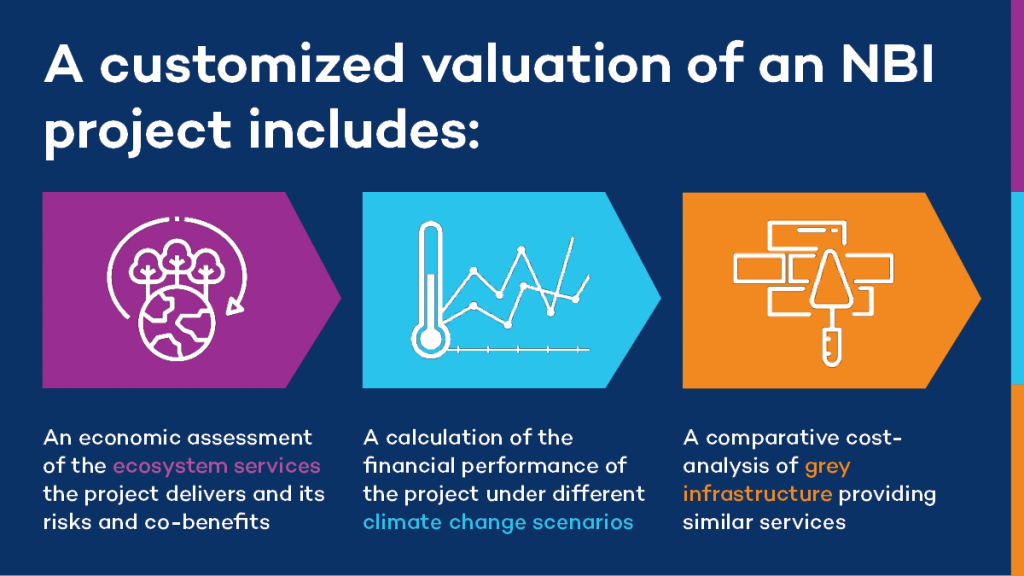The Nature-Based Infrastructure Global Resource Centre
Nature-based infrastructure (NBI) lies at the heart of climate change action. It underpins the implementation of the UN Sustainable Development Goals, the Paris Climate Accord, and the new international commitments on nature and biodiversity. Despite its wide-ranging benefits, NBI is not being scaled up enough to fulfill its potential. This is because our knowledge of the performance, predictability, and financial viability of NBI has—until now—been limited.
Together with the Global Environment Facility (GEF), the MAVA Foundation, and the United Nations Industrial Development Organization (UNIDO), IISD has established the Nature-Based Infrastructure Global Resource Centre. The NBI Global Resource Centre aims to bring together key partners to establish a business case for nature-based infrastructure. We will provide data, training, and sector-specific valuations based on the latest innovations in systems thinking and financial modelling.
We will work together with infrastructure planners, policy-makers, decision-makers, and financiers to improve the track record of NBI in delivering infrastructure services and supporting climate change adaptation while providing other environmental, social, and economic benefits.
Discover the NBI Global Resource Centre in this animation and visit the website:
Want to know more about the NBI Global Resource Centre? Check out this animation
Our Approach
The complexity of NBI requires taking a systemic approach when we plan, value, and implement infrastructure projects. It also requires knowledge integration and collaboration with partners in the field. Our work quantifies the positive impact of stewardship activities on ecosystems and demonstrates the cost efficiency of NBI.

Objectives
The NBI Global Resource Centre will seek to:
- Improve the predictability and certainty of performance of NBI through more than 40 customized valuations of NBI projects globally.
- Provide access to the data on the NBI performance through a new online database.
- Strengthen the capacity of key stakeholders to understand and value NBI through a Massive Open Online Course (MOOC) and customized training.
- Connect and build partnerships in the NBI field.
If you want to submit a proposal for assessment and collaborate with us to develop customized valuations of your projects, please contact our teams.
The valuations include:
- The creation of a qualitative assessment of the impacts of the NBI project.
- An economic assessment of the ecosystem services delivered by a given project.
- A financial assessment of the project’s performance under different climate change scenarios, with climate data derived from the EU’s Copernicus Climate Data Store.
- A comparison with the cost of grey-built infrastructure that provides the same level of services.

Through the Sustainable Asset Valuation (SAVi) assessments, we have built a wealth of experience on how to value the costs of risks and externalities, as well as the risks that can emerge from externalities over a project life cycle. We have established partnerships with active NBI stakeholders in various geographies and sectors.
Find out more on the SAVi website and the NBI Global Resource Centre website.
Our track record on planning, valuing, and implementing nature-based solutions spans across various programs.
- The National Adaptation Plan (NAP) Global Network
- SAVi NBI track record
- IISD-Experimental Lakes Area and natural infrastructure Canada
For a full overview of IISD’s work on nature-based solutions, see this page.
The GEF–MAVA project will be executed by IISD, while UNIDO will be the GEF implementing agency. GEF support comes from its Special Climate Change Fund. This work is also a key input into the work of the Global Commission on Adaptation.

Nature Based Infrastructure Related Publications

Sustainable Asset Valuation (SAVi) of Stormwater Infrastructure Solutions in Johannesburg, South Africa
A SAVi assessment of grey-green infrastructure upgrade options for stormwater infrastructure in the Paterson Park Precinct, Johannesburg.

Sustainable Asset Valuation (SAVi) of Paterson Park's Building Infrastructure: City of Johannesburg (South Africa)
The assessment of Paterson Park's building infrastructure is one of the use cases demonstrating the value of integrating climate data from the Copernicus database into SAVi.

Sustainable Asset Valuation (SAVi) of Agroforestry Nature-Based Infrastructure in Welkenraedt (Belgium)
This report describes the Sustainable Asset Valuation (SAVi) assessment of an agroforestry project in the municipality of Welkenraedt, Belgium.

Integration of Climate Data in the SAVi Nature-Based Infrastructure Model
This report outlines the integration of authoritative Copernicus Climate Data from the Climate Data Store (CDS) into a Sustainable Asset Valuation (SAVi) of nature-based infrastructure.

An Application of the Sustainable Asset Valuation (SAVi) Methodology: Assessing the economic value of restoring the wetlands of S'Ena Arrubia and Corru S'Ittiri-Marceddì-San Giovanni in the Gulf of Oristano in Sardinia, Italy
This assessment uses the Sustainable Asset Valuation (SAVi) tool to calculate the economic and societal value generated by the S’Ena Arrubia and Corru S’Ittiri-Marceddì-San Giovanni wetlands in the Gulf of Oristano in Sardinia, Italy.

Sustainable Asset Valuation (SAVi) of Senegal’s Saloum Delta
The assessment provides an economic valuation of the contribution of the Saloum Delta to local livelihoods and regional development.
Project team

Nathalie Bernasconi-Osterwalder
Vice-President, Global Strategies and Managing Director, Europe

Benjamin Simmons
Director, Sustainable Infrastructure

Liesbeth Casier
Lead, Public Procurement and Sustainable Infrastructure and Coordinator of the NBI Global Resource Centre

David Uzsoki
Lead, Sustainable Finance

Andrea Bassi
Senior Associate

Becca Challis
Communications Officer

Ronja Bechauf
Policy Advisor

Michail Kapetanakis
Research Analyst

Edoardo Carlucci
Policy Advisor

Nathalia Niño
Associate

Marco Guzzetti
Associate
Funded by
Latest
You might also be interested in
Integrating Copernicus Climate Data in the Sustainable Asset Valuation
Connecting authoritative data on climate in Europe and the rest of the world to the Sustainable Asset Valuation model to generate sophisticated analyses on the costs of climate-related risks and climate-related externalities.
Re-Energizing Canada
Oil and gas have shaped Canada’s past—but to ensure a prosperous future, the country must reduce its dependence on fossil fuel production. Find out why and how.
Sustainable Infrastructure Programme in Asia (SIPA)
SIPA provides countries in Central and Southeast Asia with capacity development and policy advice at different stages of the infrastructure investment cycle.
Task Force for a Resilient Recovery
With ideas from Canada and around the world, our Task Force aims for a resilient recovery—one that delivers good jobs, is positive for the environment, and addresses inequality.
